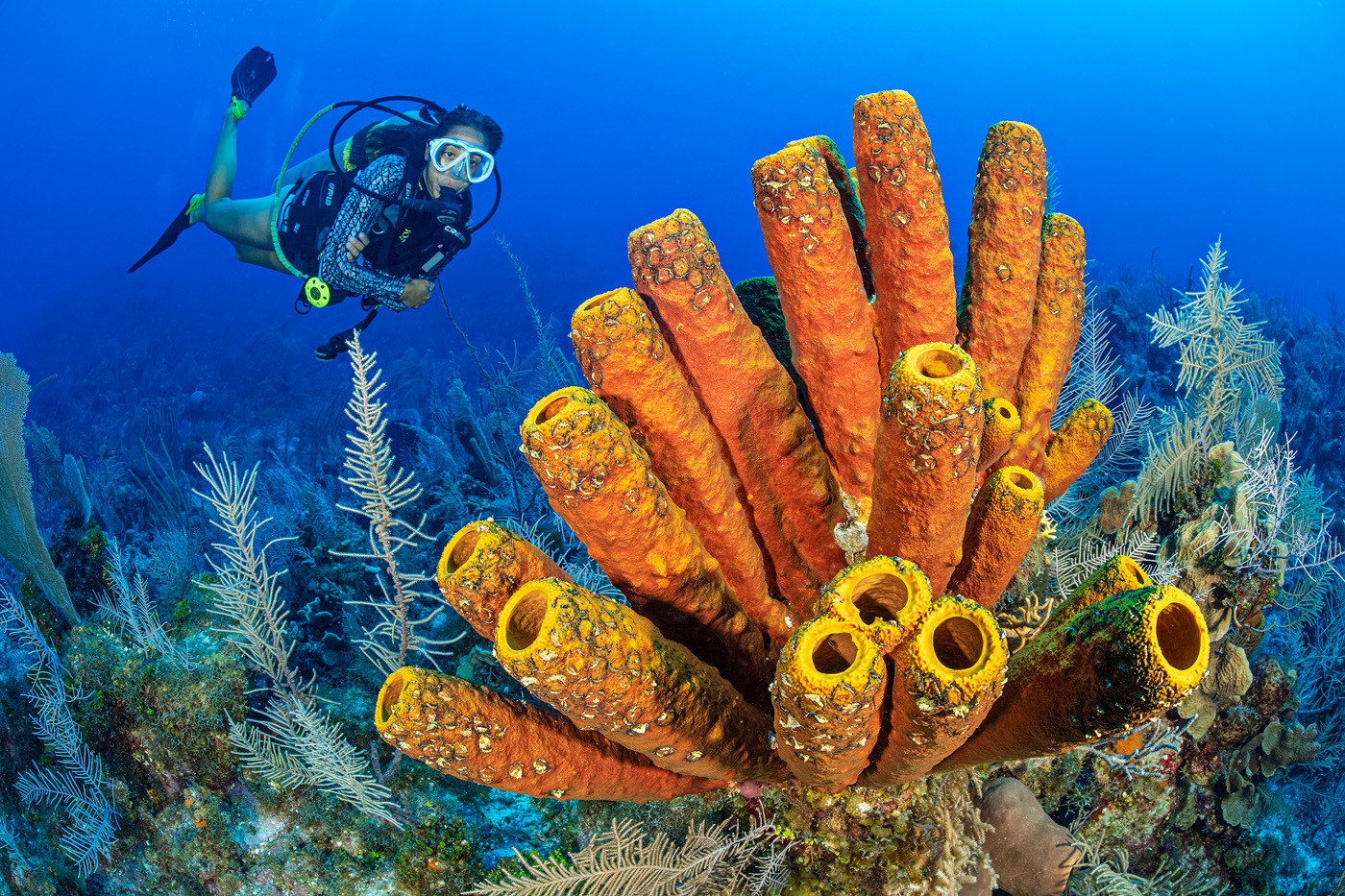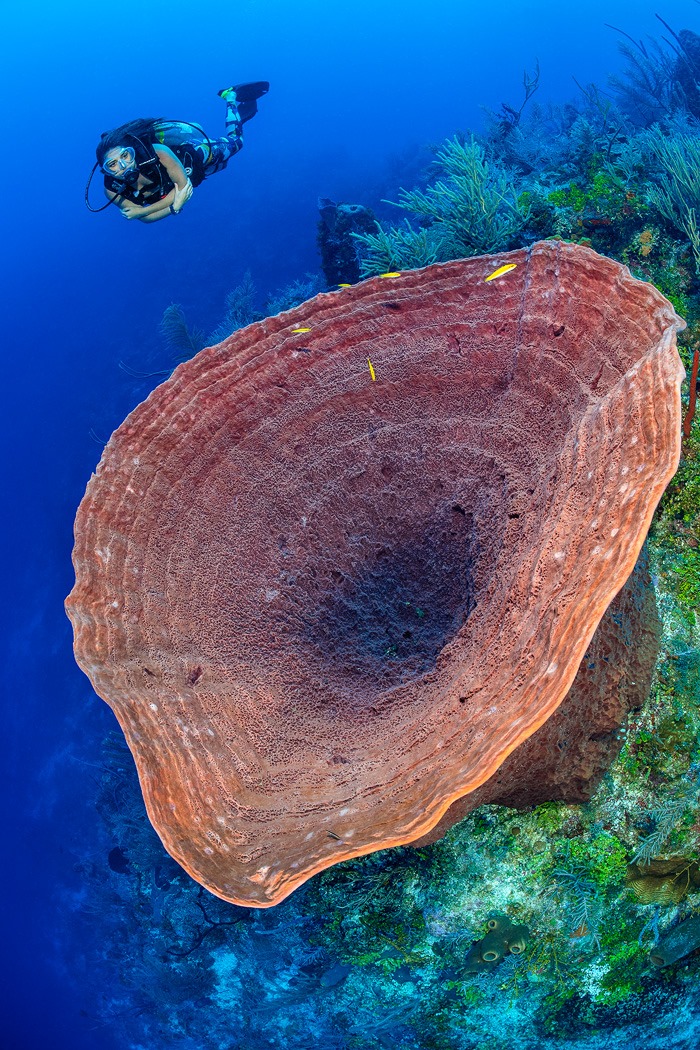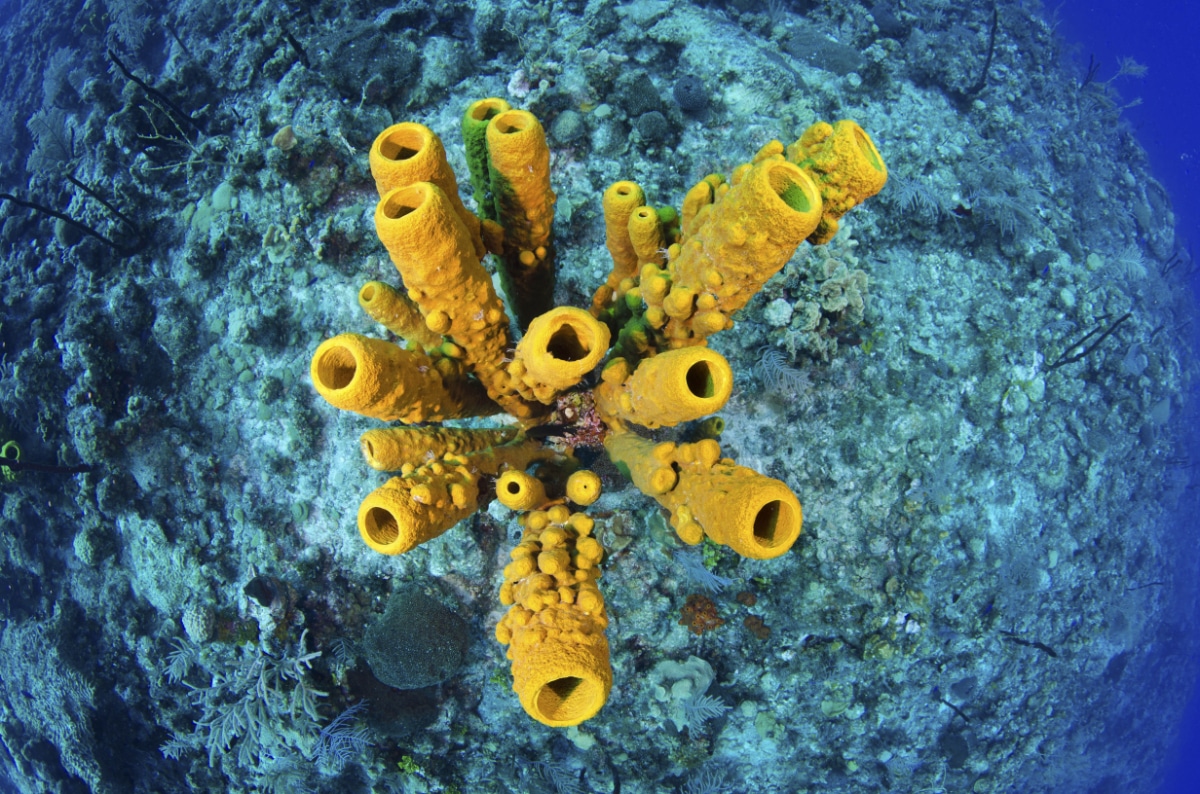News
There is no better time to enjoy Cayman’s wonderful world of sponges

As if the Cayman Islands didn’t already offer an amazing diving experience, fantastic sponge life is another reason to take a dive vacation there in 2020.
Divers who jump into any dive site in the Cayman Islands these days will witness sponges at the peak of their life cycle on local reefs. This means sponges are healthier, larger and more picturesque than they have been for more than a decade.
It has been 15 years since Hurricane Ivan struck the Cayman Islands and damaged the reefs destroying many of the sponges. The lack of storms since then has allowed them to grow back undisturbed. Alex Mustard, widely regarded as one of the world’s leading underwater photographers, photographs Cayman’s underwater world frequently and notes changes through the seasons.

Photo: Alex Mustard
“Hurricane Ivan levelled a lot of sponges on the north, east and south of the island, and I remember walking on Colliers beach straight after the storm and seeing loads and loads of sponges washed up,” he said. “A lot of them started re-growing then, and many have now reached maximum size and they look superb.”
“Sponges naturally fall off after they reach their maximum size and eventually regrow,” said Ocean Frontiers co-owner Steve Broadbelt, “but the hurricane wiped so many of them out at the same time. The quiet years have allowed them to reach maximum growth. It’s amazing to see them and we’re excited to show them to our visitors.”

Photo: Alex Mustard
Sponges attach themselves to the seafloor and filter water for food. These sea animals been around for thousands of years, and more than 6000 species of sponges can be found in oceans around the world. Cayman’s warm, clear and nutrient-rich water is ideal for Caribbean sponges and local reefs house more than 57 species in various colors. Among them; giant barrel sponges, orange elephant ear sponges, ball sponges, boring sponges, rope sponges and the rare antler sponge. If undisturbed, a giant barrel sponge can live 130 years. One of the largest sponges in Cayman is an elephant ear sponge on the west wall that measures 9 feet across.
Like corals, sponges play an important role in complex reef ecosystems. Boring and encrusting sponges compete for space with hard corals on the reef. Tube and barrel sponges give tiny goby fish a place to create their “cleaning stations.” Hawksbill turtles love to munch on the tough outer layer of barrel sponges, and angelfish feed on the soft inside of the sponge left behind by the turtles.
Steve Broadbelt says that sponges, like corals, also spawn during the year but not necessarily at the same time. Seasoned divers will have noticed. “Anyone who has been diving Cayman long enough will have seen sponges spawning at some point. This is the only time a sponge visually demonstrates that it is actually a living animal.”

Photo: Alex Mustard
Scientists believe life-saving drugs can be found in the ocean. From a large shallow water sponge in the 1950’s, scientists extracted two chemicals used to treat patients with cancer and now HIV. With much to learn about sponges and their relationship to other sea animals on the reef, there is concern about risks to their habitats; bottom trawling fishing, underwater cables, oil and gas exploration.
Underwater photographers give Cayman high marks for its picturesque reefs and drop-offs, its marine life and wrecks, and its warm, crystal clear water. The current splendor of its sponges is another reason to visit and document Cayman’s unbeatable underwater world.
Discover more about visiting and diving the Cayman Islands at www.visitcaymanislands.com
Grand Cayman also features in the WINTER 2020 issue of Scubaverse’s Dive Travel Adventures magazine – available at www.issuu.com/scubaverse soon!
Gear News
Introducing the TR-80, IR-50 and CS-30 Regulators from DYNAMICNORD

Whether you are a beginner or a professional diver – with the three new main regulators from DYNAMICNORD, everyone will find their favourite regulator. They all look super stylish.
Excellent performance with the TR-80
Quality and performance are the be-all and end-all for regulators. It is not for nothing that the TR stands for Tec Reg. The innovative design of the TR-80 guarantees absolute reliability – even in ice-cold waters.

Perfect breathing effort at 0.8 J/l / certified for diving in waters below 10 degrees / structural design made of solid brass for best cold protection / membrane-compensated design with dry seal of the first stage / reduced exhalation effort thanks to optimized exhalation membrane and bubble deflector / adjustable Venturi (dive/predive) and adjustment knob for individual inhalation comfort / innovative design of the front cover prevents free-flow in strong currents or when diving with scooters / design made of sandblasted brass, matt chrome finish / 2 HP and 4 LP outlets / mouthpiece made of high-quality, anti-allergic silicone for maximum comfort.


Amazing underwater adventures with the IR-50
The IR-50 is the top regulator for advanced and experienced divers. Natural breathing is the essence of this regulator.

Ideal breathing effort at 0.8 J/l /certified for diving in waters below 10 degrees / compensated membrane / adjustable venturi (dive/predive) and adjustment knob for individual inhalation comfort/ outlet valve and deflector for minimum exhalation effort and reduction of bubbles on the face / design made of sandblasted brass, matt chrome finish / 2 HP and 4 NP outlets / mouthpiece made of high-quality, anti-allergic silicone for maximum comfort.


The Workhorse – our CS-30
For diving centres and diving beginners – the workhorse stands for strong construction, reliability and robustness. Perfect for your training.

Optimal breathing effort at 0.8 J/l /recommended for diving in waters above 10 degrees / non-compensated piston / adjustable venturi (dive/predive) / outlet valve and deflector for minimum exhalation effort and reduction of bubbles on the face / design made of sandblasted brass, matt chrome finish / 1 HP and 3 NP outlets / mouthpiece made of high-quality, anti-allergic silicone for maximum comfort.


Octopus OP-30
The OP-30 is the ideal addition to all DYNAMICNORD regulators. It is identical in construction to the CS-30.

The TR-80, IR-50, CS-30 (DIN & INT) regulators and the Octopus OP-30 are available from DYNAMICNORD dealers and in the online store.
DYNAMICNORD – Your Outdoor Companion.
Marine Life & Conservation
Paul Watson Released as Denmark Blocks Japan’s Extradition Bid

Renowned anti-whaling activist Paul Watson has been released from custody in Greenland after spending five months in detention. Denmark’s Justice Ministry rejected Japan’s request for his extradition, citing insufficient guarantees that his time already served in custody would be credited against any potential sentence.
The 74-year-old Canadian-American was arrested on July 21 in Nuuk, Greenland’s capital, when his ship docked to refuel. His arrest was based on a 2012 Japanese warrant related to a 2010 encounter in Antarctic waters. Japan alleged Watson obstructed operations and caused damage to a whaling research ship during efforts to disrupt illegal whaling. Watson has consistently denied these claims, maintaining his commitment to marine conservation.
Denmark, which oversees extradition matters for Greenland, concluded that while the legal conditions for extradition were met, the lack of assurances from Japan regarding time-served credit made extradition untenable.
In a video shared by his foundation, Watson expressed gratitude and relief, saying, “After five months, it’s good to be out… and good to know they’re not sending me to Japan.” He added that the most difficult part of his time in custody was being separated from his two young sons.
Watson is a pioneering figure in marine conservation, known for founding the Captain Paul Watson Foundation in 2022 after decades of activism with the Sea Shepherd Conservation Society. His bold efforts to defend marine life have earned him widespread support, including from celebrities and conservationists. His work has also been featured in the acclaimed reality TV series Whale Wars.
Watson’s lawyer, Jonas Christoffersen, praised the decision, stating, “We are happy and relieved that Paul Watson is now free.” He added that Watson is eager to reunite with his family and continue his vital work.
The arrest occurred while Watson’s vessel, the M/Y John Paul DeJoria, was en route to the North Pacific with a team of 26 volunteers to intercept a Japanese whaling ship. His foundation described the arrest as politically motivated and emphasized that Watson’s actions were focused on ending illegal whaling practices.
Japan resumed commercial whaling in 2019 after leaving the International Whaling Commission, asserting that whale meat is a cultural tradition. Conservationists, however, continue to challenge these practices, highlighting their impact on marine ecosystems.
Despite the challenges, Watson remains steadfast in his mission to protect marine life and bring attention to whaling practices. His dedication to ocean conservation has made him a globally respected advocate for the environment.
-

 News2 months ago
News2 months agoIconic SS United States to become the World’s Largest Artificial Reef
-

 News3 months ago
News3 months agoBook Review – 52 Assignments: Underwater Photography
-

 Gear News3 months ago
Gear News3 months agoDYNAMICNORD – New German diving brand enters the British market
-

 News3 months ago
News3 months agoExploring Cenote El Pit: A Diver’s Dream
-

 Gear News3 months ago
Gear News3 months agoTry BARE drysuits (and maybe even win one!) this Friday with Sea & Sea at North West Dive Fest
-

 Marine Life & Conservation3 months ago
Marine Life & Conservation3 months agoBook Review: Coral Triangle Cameos
-

 Blogs2 months ago
Blogs2 months agoDive the Egyptian Red Sea this Autumn with Regaldive
-

 News3 months ago
News3 months ago2024 Ocean Art Underwater Photo Competition Announced















